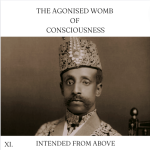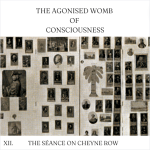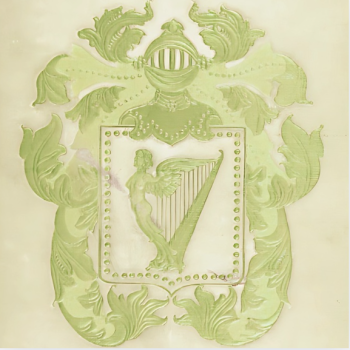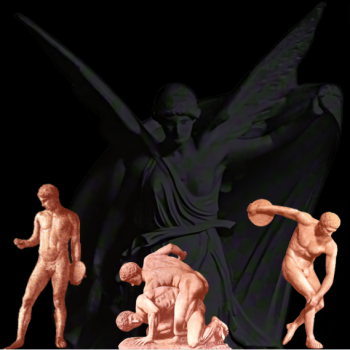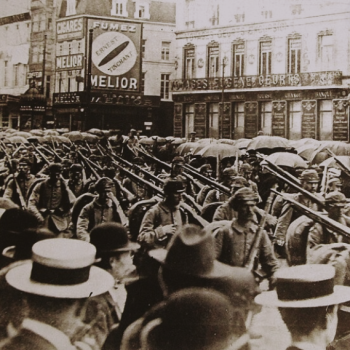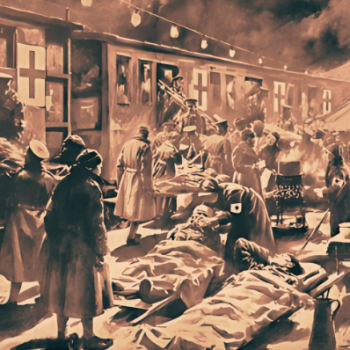EVEN IN NEW ROOMS
XIII.
⸻
The S.S. Clyde arrived in Suez on September 15, 1888.[1] Moniya was not sea-sick but had grown restless in the eleven days since leaving Bombay. He was unaccustomed to speaking English, and every passenger in the second saloon (with the exception of Srijut Mazmudar,) was English. When these other passengers tried to engage him in conversation, he could barely follow their remarks (and even when he did understand them, he could not reply.)
Moniya was ignorant of the etiquette of Western cutlery and was not bold enough to ask what dishes on the menu were meatless. Therefore, he ate all of his meals (principally sweets and fruits) in his cabin, and never at the table. Srijut Mazmudar, however, had no difficulty, for he mingled with everybody, moving freely about on deck, while Moniya hid in the cabin all day.
“Come, Moniya,” Mazmudar pleaded. “You will never learn about the English if you remain hidden away all day, and you know that lawyers must have a long tongue. You must take every possible opportunity of talking English.”
“I will try,” said Moniya, doubtful that he could conquer his shyness.
“Do not mind making mistakes,” said Mazmudar, “obviously this is unavoidable with a foreign tongue.”
One day an English passenger, an older man, taking kindly to Moniya, drew him into conversation.
“What is your name, lad?”
“Mohandas, sir,” said Moniya. “Mohandas Gandhi. My friend’s call me Moniya.”
“Where are you from?”
“My family, sir?”
“Yes.”
“The Gandhis belong to the Bania caste, and seem to have been originally grocers,” said Moniya. “For three generations, from my grandfather, they have been Prime Ministers in several Kathiawar States. My grandfather, Ota Gandhi, must have been a man of principle. State intrigues compelled him to leave Porbandar, where he was Diwan, and to seek refuge in Junagadh. Ota Gandhi married a second time, having lost his first wife. He had four sons by his first wife and two by his second wife. I do not think that in my childhood I ever felt or knew that these sons of Ota Gandhi were not all of the same mother. The fifth of these six brothers was Kaba Gandhi, my father, and the sixth was Tulsidas Gandhi. Both these brothers were Prime Ministers in Porbandar. My father married four times in succession, having lost his wife each time by death. He had two daughters by his first and second marriages. His last wife, Putlibai, bore him a daughter and three sons, I being the youngest.”
“Your father, it seems, is an intelligent man.”
“He had no education, save that of experience. At best, he might be said to have read up to the fifth Gujarati standard. Of history and geography, he was innocent. But his rich experience of practical affairs stood him in good stead in the solution of the most intricate questions and in managing hundreds of men. Of religious training he had very little, but he had that kind of religious culture which frequent visits to temples and listening to religious discourses make available to many Hindus. In his last days he began reading the Gita at the instance of a learned Brahman friend of the family, and he used to repeat aloud some verses every day at the time of worship.”
“And your mother?”
“She is deeply religious. She will not even think of taking her meals without her daily prayers. Going to the Vaishnava temple is one of her daily duties. She will take the hardest vows and keep them without flinching.”
The Englishman nodded in encouragement.
“I was born at Porbandar on the October 2, 1869,” said Moniya. “I was seven when my father left Porbandar for Rajkot to become a member of the Rajasthanik Court. There I was put into a primary school. From this school I went to the suburban school and thence to the high school, having already reached my twelfth year. I, being very shy, avoided all company. My books and my lessons were my sole companions. To be at school at the stroke of the hour and to run back home as soon as the school closed–that was my daily habit. I literally ran back because I could not bear to talk to anybody. I was even afraid lest anyone should poke fun at me.”
“We shall have to remedy that,” said the Englishman. “I insist that you come to the tables this evening as my guest.”
At dinner that evening the Englishman laughed at Moniya’s abstention from meat.
“It is all very well so far,” said the Englishman, “but you will have to revise your decision in the Bay of Biscay. And it is so cold in England that one cannot possibly live there without meat.”
“But,” Moniya replied, “I have heard that people can live there without eating meat.”
“Rest assured it is a fib,” replied the Englishman. “No one, to my knowledge, lives there without being a meat eater. Don’t you see that I am not asking you to take liquor, though I do so? But I do think you should eat meat, for you cannot live without it.”
“I thank you for your kind advice, but I have solemnly promised to my mother not to touch meat, and therefore I cannot think of taking it. If it be found impossible to get on without it, I will far rather go back to India than eat meat in order to remain there.”
Gibraltar was reached September 24, 1888.[2] The S.S. Clyde soon entered the Bay of Biscay. Moniya did not feel any compulsion to indulge in either of meat or liquor. He was advised to collect certificates of having abstained from meat, and he asked the Englishman to give him one (which he gladly supplied.)
The S.S. Clyde reached Southampton on Saturday, September 29, 1888.[3] On the boat Moniya wore a black suit. The white flannel suit which his friends bought him in Bombay, he saved for landing. He had in his mind that white clothes would suit him better when he stepped ashore. But it was the last days of September, and Moniya found he was the only person wearing such clothes. He deposited his belongings at Grindlays Bank and entered into this new world.
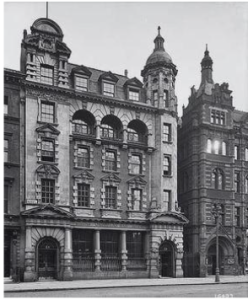
Grindlays Bank.
Moniya had four notes of introduction: Dr. P. J. Mehta, Srijut Dalpatram Shukla, to Prince Ranjitsinhji and to Dadabhoy Naoroji. Someone on board had advised Moniya and Mazmudar to stay at the Victoria Hotel in London, and they, accordingly, went there. The shame of being the only person in white clothes was already too much for Moniya. The concierge at the Victoria Hotel, however, informed Moniya that since the Grindlays was closed on Sundays, he could not retrieve his possessions until Monday. Moniya was exasperated.
Dr. Mehta (whom Moniya had wired from Southampton) called at eight o’clock the evening of their arrival. He gave Moniya a hearty greeting and smiled at him being in flannels. As they were talking, Moniya casually picked up Dr. Mehta’s top-hat to see how smooth it was. In doing so, Moniya passed his hand over it in the wrong direction, which disturbed the fur.
Dr. Mehta looked somewhat annoyed at what Moniya was doing. “No, no,” said Dr. Mehta. “Not like that.”
The mischief had been done. The incident was a warning for the future. It was Moniya’s “first lesson in European etiquette” which Dr. Mehta humorously initiated him.
“Do not touch other people’s things,” said Dr. Mehta. “Do not ask questions as we usually do in India on first acquaintance. “Do not talk loudly. Never address people as ‘sir’ whilst speaking to them as we do in India. Only servants and subordinates address their masters that way.”
“Do you understand?”
Moniya nodded.
“Now, it is very expensive to live in a hotel. I suggest you board with a private family.”
They deferred consideration of the matter until Monday. Meanwhile, Moniya and Mazmudar found the hotel to be a trying affair. Dr. Mehta was correct, it was very expensive. There was, however, a Sindhi fellow-passenger from Malta who had become friends with Mazmudar. This new acquaintance was no stranger to London, and he offered to find rooms for them. Moniya and Mazmudar agreed.
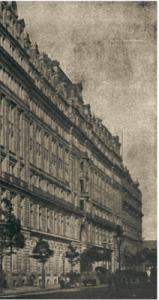
Victoria Hotel, London.[4]
As soon as they retrieved their luggage on Monday, they paid up their bills and went to the rooms rented for them by their Sindhi friend. Moniya’s hotel bill came to £3, an amount which shocked him, for he had practically starved in spite of this heavy bill! For I could relish nothing. When he did not like one thing, he asked for another, but had to pay for it just the same.
Moniya was very uneasy, even in the new rooms. He thought continuously of his home and country. It was the day before his nineteenth-birthday. His mother’s love haunted him. At night the tears streamed down his cheeks, and his homesickness made sleep an impossibility. Of course, he could not disclose his misery with anyone. Even if he could have done so, what was the use? He knew of nothing that would soothe him. Everything was foreign—the people, their customs, and even their homes. He was a novice in the matter of English etiquette and was continually on my guard. There was also the inconvenience of his vegetarian vow. Even the dishes he could eat were “tasteless and insipid.” He found that he could not bear England, but to return to India was out of the question. Now that he was here, he must see his three years to the end.
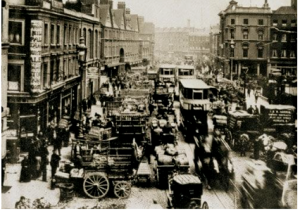
London, 1888.
~
Dr. Mehta went on Monday to the Victoria Hotel expecting to find Moniya there. He discovered that they had left and got the address of their new rooms.
When Dr. Mehta found Moniya, he learned the boy, through “sheer folly,” had managed to get ringworm on the steamer.
“What happened?” asked Dr. Mehta. “Did you bathe on the steamer?”
“Yes.”
“Did you use soap?”
“Yes.”
It was a common mistake. Steamers used sea-water, in which soap was not soluble. Moniya, however, used soap, “taking its use to be a sign of civilization.”
“Apply acetic acid,” said Dr. Mehta.
Dr. Mehta inspected the room, and its shook his head in disapproval.
“This place won’t do,” said Dr. Mehta. “We come to England not so much for the purpose of studies as for gaining experience of English life and customs. And for this you need to live with a family. But before you do so, I think you had better serve a period of apprenticeship with Dalpatram Shupla in Richmond. I will take you there.”[5]
← →
THE AGONISED WOMB OF CONSCIOUSNESS SECTIONS:
INTRO: CHARLEY.
I. WITCH TALES.
II. CARELESS WHENCE COMES YOUR GOLD.
III. THE TIMES ARE CHANGED.
IV. DENIZEN OF ETERNITY.
V. DOMOVOY.
VI. WITH LOW AND NEVER LIFTED HEAD.
VII. IMPERIAL GOTHIC.
VIII. THE SERVANT OF THE QUEEN.
IX. THE DWELLER ON THE THRESHOLD.
X. INDO-GOTHIC YOGA.
XI. INTENDED FROM ABOVE.
XII. THE SÉANCE ON CHEYNE ROW.
XIII. EVEN IN NEW ROOMS.
XIV. RUSSIA’S LEGENDARY LORE.
[APPENDICES]
SOURCES:
[1] “The Mails.” The Standard. (London, England) September 17, 1888.
[2] “The Mails.” The Standard. (London, England) September 25, 1888.
[3] “Mail and Shipping News.” The Guardian. (London, England) September 29, 1888.
[4] George, Marian M. A Little Journey to England and Wales. A. Flanagan Company. Chicago, Illinois. (1901): 19.
[5] Gandhi, M.K. The Story of My Experiments with Truth. Navajivan Press. Ahmedabad, India. (1927): 15-20, 105-114; Hunt, James D. Gandhi in London. Promilla & Co., Publishers. New Delhi, India. (1978): 8-9.


